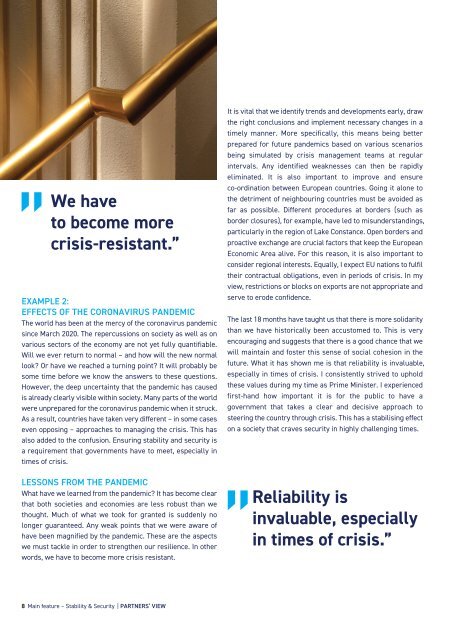Partners' View 2|2021 english
You also want an ePaper? Increase the reach of your titles
YUMPU automatically turns print PDFs into web optimized ePapers that Google loves.
„<br />
We have<br />
to become more<br />
crisis-resistant.”<br />
EXAMPLE 2:<br />
EFFECTS OF THE CORONAVIRUS PANDEMIC<br />
The world has been at the mercy of the coronavirus pandemic<br />
since March 2020. The repercussions on society as well as on<br />
various sectors of the economy are not yet fully quantifiable.<br />
Will we ever return to normal – and how will the new normal<br />
look? Or have we reached a turning point? It will probably be<br />
some time before we know the answers to these questions.<br />
However, the deep uncertainty that the pandemic has caused<br />
is already clearly visible within society. Many parts of the world<br />
were unprepared for the coronavirus pandemic when it struck.<br />
As a result, countries have taken very different – in some cases<br />
even opposing – approaches to managing the crisis. This has<br />
also added to the confusion. Ensuring stability and security is<br />
a requirement that governments have to meet, especially in<br />
times of crisis.<br />
LESSONS FROM THE PANDEMIC<br />
What have we learned from the pandemic? It has become clear<br />
that both societies and economies are less robust than we<br />
thought. Much of what we took for granted is suddenly no<br />
longer guaranteed. Any weak points that we were aware of<br />
have been magnified by the pandemic. These are the aspects<br />
we must tackle in order to strengthen our resilience. In other<br />
words, we have to become more crisis resistant.<br />
It is vital that we identify trends and developments early, draw<br />
the right conclusions and implement necessary changes in a<br />
timely manner. More specifically, this means being better<br />
prepared for future pandemics based on various scenarios<br />
being simulated by crisis management teams at regular<br />
intervals. Any identified weaknesses can then be rapidly<br />
eliminated. It is also important to improve and ensure<br />
co-ordination between European countries. Going it alone to<br />
the detriment of neighbouring countries must be avoided as<br />
far as possible. Different procedures at borders (such as<br />
border closures), for example, have led to misunderstandings,<br />
particularly in the region of Lake Constance. Open borders and<br />
proactive exchange are crucial factors that keep the European<br />
Economic Area alive. For this reason, it is also important to<br />
consider regional interests. Equally, I expect EU nations to fulfil<br />
their contractual obligations, even in periods of crisis. In my<br />
view, restrictions or blocks on exports are not appropriate and<br />
serve to erode confidence.<br />
The last 18 months have taught us that there is more solidarity<br />
than we have historically been accustomed to. This is very<br />
encouraging and suggests that there is a good chance that we<br />
will maintain and foster this sense of social cohesion in the<br />
future. What it has shown me is that reliability is invaluable,<br />
especially in times of crisis. I consistently strived to uphold<br />
these values during my time as Prime Minister. I experienced<br />
first-hand how important it is for the public to have a<br />
government that takes a clear and decisive approach to<br />
steering the country through crisis. This has a stabilising effect<br />
on a society that craves security in highly challenging times.<br />
„<br />
Reliability is<br />
invaluable, especially<br />
in times of crisis.”<br />
8 Main feature – Stability & Security | PARTNERS‘ VIEW














